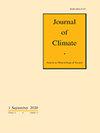An Assessment of Convergence of Climate Reanalyses from Two Coupled Data Assimilation Systems with Identical High-Efficiently Filtering
IF 4
2区 地球科学
Q1 METEOROLOGY & ATMOSPHERIC SCIENCES
引用次数: 0
Abstract
Abstract Coupled data assimilation (CDA) uses coupled model dynamics and physics to extract observational information from measured data in multiple Earth system domains to reconstruct historical states of the Earth system, forming a reanalysis of climate variability. Due to imperfect numerical schemes in modeling dynamics and physics, models are usually biased from the real world. Such model bias is a critical obstacle in the reconstruction of historical variability by combining model and observations, and, to some degree, causes divergence of CDA results because of individual model behavior in each system. Here, based on a multitimescale high-efficiency filtering algorithm which includes a deep ocean bias relaxing scheme, we first develop a high-efficiency online CDA system with the Community Earth System Model (CESM-MSHea-CDA). Then, together with the other previously-established CDA system (CM2-MSHea-CDA) within the Coupled Model version 2.1 model that is developed by Geophysical Fluid Dynamics Laboratory, we conduct climate reanalysis for the past four decades (1978–2018). Evaluations show that due to improved representation for multiscale background statistics and effective deep ocean model bias relaxing, both CDA systems produce convergent estimation of variability for major climate signals such as variability of basin-scale ocean heat content, ENSO, PDO, etc. Particularly, both CDA systems generate similar time-mean of global and Atlantic meridional overturning circulations that converge to the geostrophic velocity estimate from climatological temperature and salinity data. The CDA-estimated mass transport at typical measurement sections is mostly consistent with the observations.对来自两个具有相同高效过滤功能的耦合数据同化系统的气候再分析收敛性的评估
摘要 耦合数据同化(CDA)利用耦合模式动力学和物理学,从多个地球系统域的实测数据中提取观测信息,重建地球系统的历史状态,形成气候变率的再分析。由于动力学和物理学建模的数值方案不完善,模型通常与真实世界存在偏差。这种模式偏差是结合模式和观测资料重建历史变率的关键障碍,并在一定程度上造成了各系统中模式行为的差异,从而导致 CDA 结果的偏差。在此,我们首先基于包含深海偏差松弛方案的多时间尺度高效滤波算法,利用群落地球系统模式开发了高效在线 CDA 系统(CESM-MSHea-CDA)。然后,我们与地球物理流体力学实验室开发的耦合模式 2.1 版模式中另一个先前建立的 CDA 系统(CM2-MSHea-CDA)一起,对过去四十年(1978-2018 年)进行了气候再分析。评估结果表明,由于改进了多尺度背景统计的表示和有效的深海模式偏差放松,两个 CDA 系统对主要气候信号(如海盆尺度海洋热含量变率、厄尔尼诺/南方涛动、PDO 等)的变率估计趋于一致。特别是,两种 CDA 系统都能生成类似的全球和大西洋经向翻转环流时间均值,这些均值与气候学温度和盐度数据的地转速度估计值趋同。在典型的测量断面上,CDA 估算的质量传输与观测结果基本一致。
本文章由计算机程序翻译,如有差异,请以英文原文为准。
求助全文
约1分钟内获得全文
求助全文
来源期刊

Journal of Climate
地学-气象与大气科学
CiteScore
9.30
自引率
14.30%
发文量
490
审稿时长
7.5 months
期刊介绍:
The Journal of Climate (JCLI) (ISSN: 0894-8755; eISSN: 1520-0442) publishes research that advances basic understanding of the dynamics and physics of the climate system on large spatial scales, including variability of the atmosphere, oceans, land surface, and cryosphere; past, present, and projected future changes in the climate system; and climate simulation and prediction.
 求助内容:
求助内容: 应助结果提醒方式:
应助结果提醒方式:


